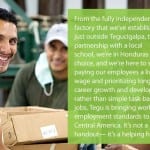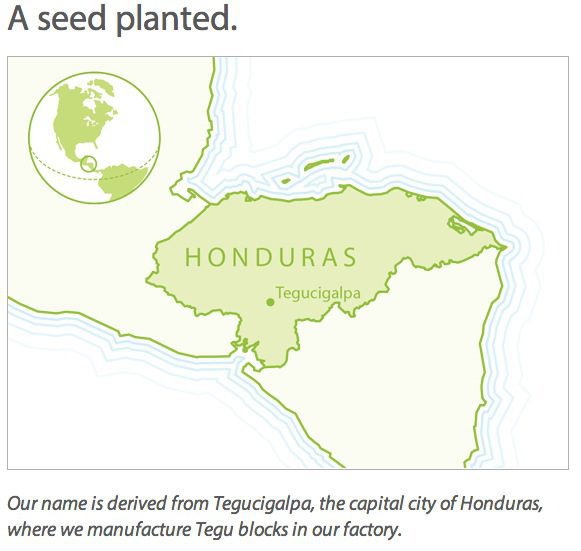How do you take down poverty? One toy block at a time.”
In Honduras, where 64% of the population lives below the poverty line, a for-profit business, Tegu Toys, is improving the quality of its employees’ lives, creating more jobs as it grows, and giving families a vision of a new and better future.
A 3-minute video says “… What we really need to address issues of poverty is economic growth through for-profit mechanisms that create sustainable opportunities for people.”
 (Click to enlarge graphic) Chris Haughey, co-founder of the company, says the real solution to poverty is to launch many small engines of economic growth that affect not just a few people for a little while, but entire communities — with the potential to permanently change an entire society for the better.
(Click to enlarge graphic) Chris Haughey, co-founder of the company, says the real solution to poverty is to launch many small engines of economic growth that affect not just a few people for a little while, but entire communities — with the potential to permanently change an entire society for the better.
“You think the solution to poverty is more aid or more charitable giving, but those are only short-term, stopgap solutions. If you care about the poor, then you are going to seek out ways to create new economic opportunities for them,”
From the YouTube site “If we truly care about helping the poor, we should prioritize economic growth, which is the key to lifting whole societies from poverty to prosperity. In the AEI book “Economic Growth: Unleashing the Potential of Human Flourishing,” three professors provide a compelling moral and economic case for growth. The authors write: “Economic growth marks a boundary between wealth and human flourishing, on one side, and poverty and degradation, on the other.””
Read the full text of Strachan’s post and watch the inspiring video by clicking here.
Learn more about Tegu Toys by clicking here.
Other commentary…
Owen Strachan posts at thoughtlife about how the workings of the free market hold much greater potential for positive long-term improvement in the lives of people in poverty.
According to the blog Patheos, “The standard Western answer to the problem of poverty today is to throw scads of money at it. That’s well-intentioned and perhaps may have some positive short-term effects. But it seems a far better approach in the long-term to create wealth where there currently is none. That means creating jobs through the ingenuity of the human imagination and the workings of the free market.
Tags: Featured, Honduras, Systemic change

